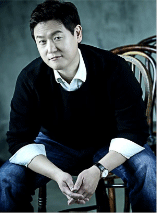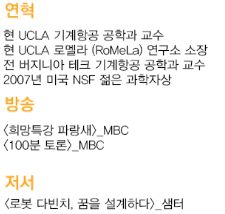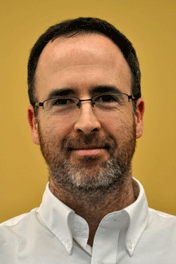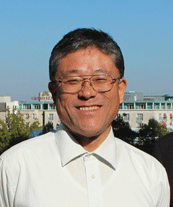| |
| Friday, October 14, 14:00-17:00, Rm. 201 |
| |
| This forum will provide the prospects of robotics to the future society. Invited speakers from USA, Canada and Japan will deliver the latest research and activities on robotics to young students. |
| |
| Program |
| |
| 02:00 pm - 03:00 pm |
Prof. Dennis Hong, <로봇, 세상을 구하다> |
| 03:00 pm - 04:00 pm |
Prof. Richard Vaughan, <Intelligent interactions with surprisingly simple robots> |
| 04:00 pm - 05:00 pm |
Prof. Satoshi Tadokoro, <Disaster Robotics> |
|
| |
| |
 |
| |
| UCLA의 교수로서 로봇연구의 메카로 각광 받는 로봇연구소 로멜라(RoMeLa)의 설립자이다. 세계 최초 시각장애인을 위한 자동차를 비롯해 인간을 위한 따뜻한 기술을 개발하고 있다. 다르게 보기, 새롭게 생각하기, 로봇 다빈치, 꿈을 설계하다, From Odin to DARwin: Robot evolution by intelligent design 등의 내용으로 강연을 진행한다. |
| |
 |
 |
Prof. Dennis Hong
University of California,
Los Angeles, USA |
|
| |
| |
 |
| |
| Sensing technology for robots has improved dramatically in the last few years, but we do not see robots around us yet. How should robots behave around people and each other to get things done? My group works on behavioral strategies for mobile robots that exploit the new sensing capabilities, and allows them to perform sophisticated, robust interactions with the world and other agents.
I'll show videos of a series of novel vision-mediated Human-Robot Interactions with teams of driving and flying robots. I'll also describe work on adaptive path planning and task allocation where we reach very good performance on hard optimization problems.
In most cases the mechanisms we use are surprisingly simple, and we like it that way.
|
| |
 |
Richard Vaughan is Associate Professor of Computing Science at Simon Fraser University, where he directs the Autonomy Lab. Previously he was a researcher at HRL Laboratories and the University of Southern California. He received a PhD in Computation from the University of Oxford in 1999. His research interests include long-term autonomous robots, multi-robot systems, behavioural ecology, human-robot interaction, and devising tools and techniques for developing and experimenting with robots. He demonstrated the first robot to control animal behaviour in 1998, co-created the Player/Stage Project in 2000, and recently showed the first uninstrumented HRI with teams of UAVs. He currently serves on the administrative committee of the IEEE Robotics and Automation Society, and the editorial board of the Autonomous Robots journal, and is the Program Chair for IROS 2017. |
Prof. Richard Vaughan,
Simon Fraser University,
Canada |
|
| |
| |
 |
| |
| The Great Eastern Japan Earthquake was the first disaster where many robotic systems were used for disaster response and recovery. It is predicted that robotic systems become essential solutions in the near future. In this speech, the speaker will introduce special topics on disaster robots and systems developed by his group. |
| |
 |
Satoshi Tadokoro received the ME degree in 1984 from the University of Tokyo, and the DE degree in 1991. He has been a professor in the Graduate School of Information Sciences, Tohoku University since 2005, and Deputy Dean since 2012. He was the project leader of the MEXT DDT Project on rescue robotics in 2002-2007. He developed Quince, a UGV for CBRNE disasters, in 2010 which was used in Fukushima-Daiichi Nuclear Power Plant response. He established RoboCupRescue in 1999, IEEE Robotics and Automation Society (RAS) TC on Safety, Security and Rescue Robotics in 2001, and the International Rescue System Institute (IRS) in 2002. He served as a trustee of the RoboCup Federation, a director of JSME Robotics Mechatronics Division, a board member of Robotics Society of Japan (RSJ) and Society of Instrumentation and Control Engineers (SICE), and an AdCom member and VP for Technical Activities of IEEE RAS. He is at present the president of IRS, and the IEEE RAS President. |
Prof. Satoshi Tadokoro,
Tohoku University,
Japan |
|
| |
| |
| |
| |











